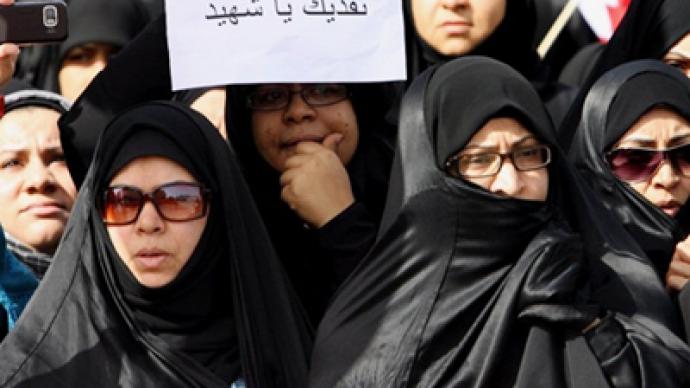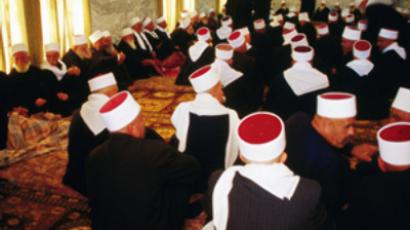Bahrain rocked by Egypt-inspired protests

Bahrain, a main US ally in the Gulf region, is being roiled by protests, with the Bahraini army having taken up positions in the capital of Manama. While the country is torn between pro- and anti-regime crowds, Western trace is revealed by the media.
Shockwaves from upheavals in Tunisia and Egypt have spread across the greater Middle East, with opposition protests sweeping through other countries in the region. On Thursday, protests broke out in Manama, the capital of Bahrain, a small island country off the western shore of the Persian Gulf. The Bahraini protesters called on their monarch, Hamad ibn Isa Al Khalifa, to give up control over top government posts and all critical decisions. The country is also driven by a long-running confrontation between the Sunni and Shiite (or Shia) religious groups. The Shiites say they face systematic discrimination and poverty and are blocked from key roles in public service and the military. The demonstrators demanded on Thursday that Shiites’ grievances be urgently addressed.The protesters, inspired by the uprising in Egypt, occupied the main square of Manama, but were soon violently pushed out by riot police. The police, who also brought along tanks, swept through the square, killing five and injuring at least 230 people, the Associated Press reported. The same day, Bahrain's leaders banned public gatherings and Foreign Minister Khalid Al Khalifa said the brutal quashing of the protests was necessary because the demonstrators were "polarizing the country" and pushing it to the "brink of a sectarian abyss," the AP quoted the foreign minister as saying.On Friday, Bahrain woke up to find itself divided between regime supporters and protesters. The country is in a near-state of emergency, with military forces positioned in key areas and checkpoints set up on main roads.Friday also saw thousands of mourners gather in Bahrain at the funerals of anti-government demonstrators killed the previous day. The worshippers were no longer satisfied with their original demands of loosening the monarchy’s grip on power. During Friday’s prayers, the demonstrators chanted "the regime must go" and "we will never accept humiliation," the AP reported.These protests were also forcefully quelled. Soldiers fired tear gas and shot heavy weapons into the air as thousands of protesters defied a government ban in Manama. Hospital officials said over 20 people were injured, according to the AP. The riot police in Bahrain have reportedly used supplies made by British companies to clear the protests. These include shotguns, crowd-control ammunition and stun grenades. Human rights watchdogs are calling for an arms embargo and full disclosure of why the exporters were given licenses.The UK denies any responsibility for supplying Bahrain with their weapons. Barnaby Pace from the Campaign Against the Arms Trade agrees that it is hard to control how the weapons are going to be used once they are sold, but on the other hand, the UK is not very choosy about whom it deals arms to. “Your chain of responsibility does not stop once you have handed over the weapons,” he said. “The UK government should seriously reconsider how it approaches arms sales in the first place. Not only have these arms been licensed to be sold overseas in the case of Bahrain, but they are actively promoted as such. The UK government actively promotes their arms to a number of oppressive regimes.”Wherever the arms come from, Bahrain, as well as other Middle Eastern countries facing riots, seems to have learned one major lesson from what has happened in Egypt, says British author and journalist Anatol Lieven: Do not compromise, otherwise you will disappear. The Bahraini government and military might not find this task as difficult to tackle as other Middle Eastern regimes.“In Bahrain, the army and most of the population are from different ethnic-religious groups,” said Lieven. “The army is Sunni, but the population is largely Shiite. That, of course, makes it much easier for the army to crack down than in Egypt and Tunisia, where the army and the population were the same people.”













